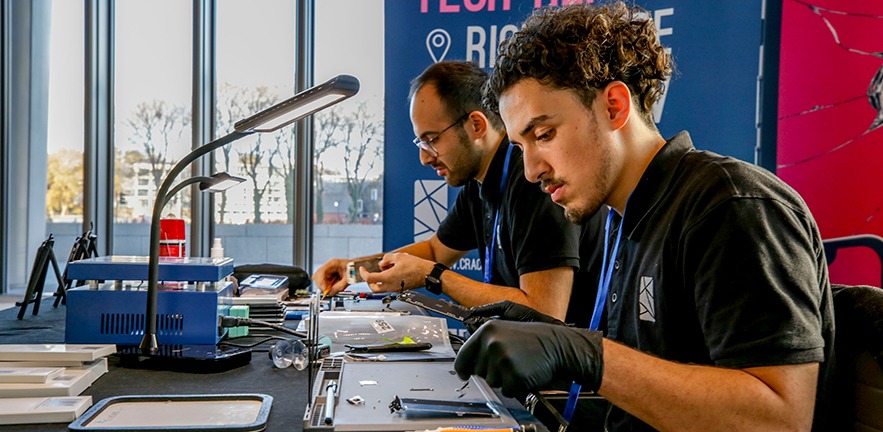Overview
Cracked It is London’s award-winning social enterprise smartphone repair service. Staffed by young ex-offenders and youth at risk, its mission is to harness the smartphone repair market to support vulnerable youth away from crime and towards employment.
Cracked It takes mobile phone repair to offices across London, with pop-up repair clinics in large corporate workplaces such as UBS, the Ministry of Justice and the US Embassy, staffed by young people trained in both repair skills and workplace behaviour. A benefit of this model is that young people are exposed to professional workplaces, and corporate teams have the chance to get to know young people who they may not have considered employable.

Named one of ‘London’s best iPhone fixers’ by the London Evening Standard and described by Mobile Magazine as ‘disrupting the industry,’ Cracked It has been featured in The BBC, The Observer, The Guardian, TimeOut, The Huffington Post, London Live and VICE.
Achieving a success rate of 64% of trainees on its transitional employment programme gaining employment within a year, and 70% not re-offending in the same period, it’s easy to see why its founder, Josh Babarinde, was named in Forbes’ Europe 30 under 30 list in 2019. With many other awards under its belt too, Cracked It’s impact is widely recognised.
Reflecting on his business model during the COVID-19 crisis, Josh realises that the time has come to focus on the bigger picture by creating a platform to share his organisation’s learning with the wider business and social enterprise community.
How does Cracked It work?
Cracked It’s transitional employment programme gives paid employment and training to young offenders and at risk youth aged 18-30. These trainees benefit from:
- work placement – six to twelve months learning about the norms of employment and developing key employability skills during a paid placement in Cracked It’s repair operation
- coaching – trainees are coached (rather than disciplined) through mistakes made on placement, a style of learning that is often new to them
- signposting – trainees are connected with specialist support services to help overcome barriers to their progression, eg mental health support
- employability experiences – trainees benefit from mock interviews and CV writing sessions with Cracked It’s corporate partners.
With 64% of trainees gaining employment within one year and 70% not re-offending in the same period, it’s clear this model works.
How did Cracked It come into being?
Cracked It was the brain child of former political intern and youth worker, Josh Babarinde.
“Bad luck can play a big part in shaping people’s lives. I myself experienced some seriously challenging times during my childhood, yet, thanks to great family, education and networks, have pursued a fulfilling life,” says Josh. “Many don’t get this chance. Recognising this inspired me to study politics and begin my career as a political intern.”
“I soon realised that I could make a bigger difference in a more community-based role though, so volunteered as a youth worker. Working with ex-offenders and youth at risk, helping them go as far as their talents – rather than luck – could take them, became my focus.”
Working in this field, often-quoted statistics began to feel increasingly unsettling to Josh:
- People aged under 30 commit 85% of violent crime
- Employment is known to reduce the chances of an offender re-offending by up to 50%.
Hearing the life stories behind some of these statistics, and witnessing first hand how young ex-offenders and at risk youths were being dismissed or shoe-horned into roles they did not fit, he began to think about how to do things differently.
“It was clear we needed a new way to engage with at risk youth,” says Josh. “To succeed, any new intervention would need to appeal to the need among many young people for instant gratification, their desire for income, and their need for positive recognition, which often hasn’t been a feature of their lives outside of crime. I wanted the intervention to be tech-based too, since this matched their aspirations and an economic need.”
Gathering facts, Josh discovered that the UK’s smartphone repair market was worth £2 billion annually and that 76% of people with a smashed screen didn’t get a repair within six months, because existing repair options were inconvenient. Being located in Greater London, where so many work hubs presented an opportunity to take the service to people in their workplaces, the idea for Cracked It was born.
What’s next?
Before lockdown, Cracked It had reached the tipping point of achieving systemic impact, thanks to their corporate partnership model. Many organisations are offender-averse in their hiring practices, yet Josh and his team have proven that ex-offenders are a valuable part of the workforce and do contribute positively to the workplace.
“Lockdown, of course, has made many businesses aware of the need to digitise their offering,” says Josh. “This is something we’re already working on, but for me, Lockdown revealed an even bigger opportunity: we have five years’ experience successfully supporting ex-offenders and collaborating with some of the world’s biggest organisations to do it. The time has come to share our learning across the sector, and leverage our corporate partners, profile and team to achieve change beyond Cracked It and the young people we engage with directly.”

